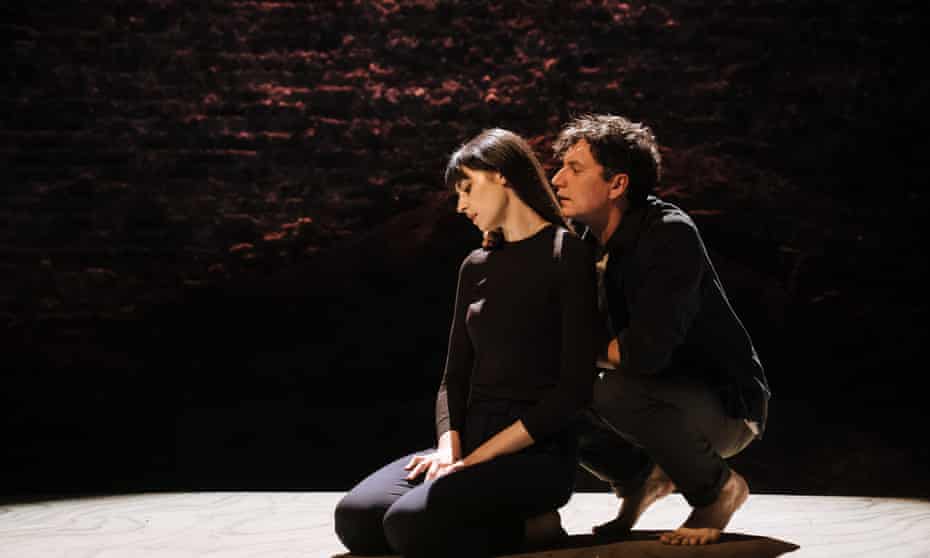Donmar Warehouse – until 27 November 2021
4****
Reviewed by Claire Roderick
The Donmar Warehouse reopens in style with this disturbingly hypnotic play by Cordelia Lynn exploring the repeating cycles of violence in history, politics, and personal relationships.
Deceptively beginning in a similar style to Constellations, with unlinked scenes from a burgeoning relationship played out in quick succession, Lynn’s play soon begins to reveal its true colours as pressures build on the couple. The scene transitions are occasionally marked by recorded descriptions of the feelings of the lovers – whether this is a reference to his poetry or to the events being played over and over throughout the ages is left to the audience to decide.
The couple, unnamed and credited as Him (Tom Mothersdale) and Her (Abigail Weinstock) meet at a party in her flat. While he spouts trite student activist catchphrases at her, in a tirade that veers between intimidation, creepiness and childish need, her reactions are hilarious as she tries to placate and extract herself from his presence. Eventually he relaxes and an almost real conversation begins. She is a Jewish physicist working at the University, and he is a student of Polish descent who writes poetry, later teaching history at the same university. The country remains unnamed but could be any Western state as his protests against the government and their actions are discussed. The rise of fascism in the country is at first seen through silly things as they make jokes about the flags they must fly by law, but the crackdown against immigrants and individuals and groups who do not fit in with the state’s ideology soon becomes terrifying.
The upheaval of norms from these political events is mirrored by the turbulent relationship of the couple, who talk and talk, but never seem to understand each other. They find out that their great-grandparents were both from Lemberg, but as he is Polish and she a Jew, it is best if they don’t explore the connection further. The charm and schoolboy enthusiasm for social justice of the man cannot mask his narcissism and gaslighting of his lover, and when they run out of words, physical violence soon follows. The characters reveal their true selves rarely and in guarded snippets, but these sections are glorious and devastating. After sitting through an extraordinary piece of mansplaining about how they should have a child, her explanation of her unwillingness is a bold and bare comparison of her belly to the mass graves of the Holocaust and Pogroms that still doesn’t pierce his egotism. His description of a protest where he was part of a murderous mob is shockingly real, and both actors are phenomenal in these scenes. Astonishingly, this is Weinstock’s professional debut, her naturalistic expressions and physicality is a revelation. Mothersdale also impresses as the ever more unsympathetic Him, and the chemistry between the two is magnetic.
Director Elayce Ismail doesn’t need any major effects during the first part of the play, as the pair’s performances on Basia Binkowska’s bare wooden floor are enough to grip. The final half hour sees a hidden set revealed that takes the action back to Lemberg in 1918 as the Ukrainians retreat and the Poles take over the town and carry out a Pogrom on the Jews. Here we see Weinstock play her great-grandmother, Baba and the wonderful Richard Katz play her father. As the Poles advance, he refuses to leave, having been moved on so many times, insisting that they just need to sit it out. As glass shatters and the sound of running feet become louder outside, he comforts her with the story of how he wooed her mother, and these charming moments explain so much of Her actions and fears in the modern scenes. Of course, the Polish soldier who comes to their home is His great- grandfather, and the interplay between them disturbingly echoes pivotal moments in the modern relationship. After such a quiet, minimalistic portrayal of the modern world, the busy, frantic horror of the Pogrom feels like it belongs in a different production at first, but the connections and ripples through history break through, reminding us that the quiet insidious rise of violent ideology is equally horrifying.
Love and Other Acts of Violence is a glorious return for The Donmar – the phenomenal cast dazzle in this dark and disturbing play

